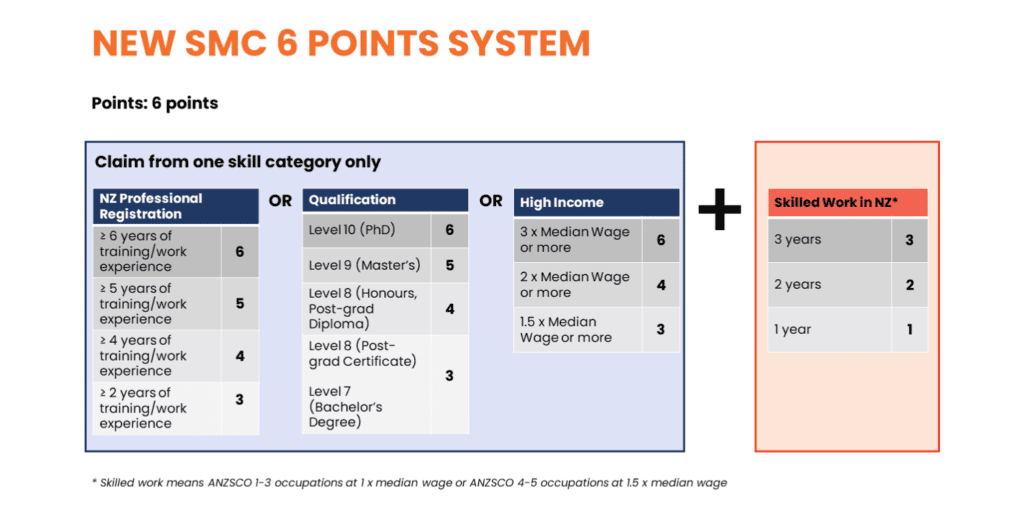Introduction
Are you a specialist or highly trained professional looking to live in New Zealand? You might be eligible for a Skilled Migrant resident visa. This guide will explain the application process and what you can expect.
What is a Skilled Migrant Visa?
The Skilled Migrant Category (SMC) resident visa targets individuals with skills needed for New Zealand’s economic growth. With this visa, you can live, work, and study in New Zealand indefinitely.
The SMC visa offers a direct pathway to residence for skilled individuals with job offers in New Zealand, meeting age and English language requirements, and fulfilling the necessary skill threshold. As of October 2023, a simplified points system sets clear skill thresholds based on qualifications, registrations (if required), or income from employment. This aims to grant residence to those who can meet New Zealand’s medium-to-long-term skill needs, which are hard to fill from the domestic labor market.
What are the Criteria?
Under the new points system, applicants need at least 6 points to be eligible for the SMC visa. Points are allocated based on one of the following three categories, with any deficit made up through New Zealand work experience. Even with 6 points, a job offer and meeting the English language requirements are mandatory.
- Points from Income
Your income in New Zealand can earn you 3 to 6 points, depending on how much it exceeds the median wage. This category is suitable for highly skilled professionals, including many trades, who develop their skills on the job. The job or job offer must be full-time (minimum 30 hours per week) with an accredited employer.
- 3 points: Income 1.5 times above the median wage
- 4 points: Income twice the median wage
- 6 points: Income three times the median wage
- Points from Qualifications
Points are awarded based on your highest qualification level and its New Zealand Qualification Framework (NZQA) equivalent.
- 6 points: Level 10 Doctorate Degree
- 5 points: Level 9 Master’s Degree
- 4 points: Level 8 Bachelor’s Degree or Post Graduate Diploma
- 3 points: Level 8 Post Graduate Certificate or Level 7 Bachelor’s Degree
If you have an overseas qualification, it may need to be assessed by NZQA. From October 2023, Immigration New Zealand will update their list of qualifications that do not require evaluation. Note that non-degree qualifications at NZQA Level 7 or below do not earn points.
- Points from Occupational Registration
Points are awarded based on the length of training required for your occupational registration in New Zealand.
- 6 points: Minimum 6 years of training
- 5 points: Minimum 5 years of training
- 4 points: Minimum 4 years of training
- 3 points: Minimum 2 years of training
Combining Points from Different Categories
Applicants can only claim points from one skill category (qualification, registration, or income) that offers the most points. Points cannot be combined across different categories.
- Additional Points from Work Experience
If you don’t meet the 6-point threshold through income, qualifications, or occupational registration, you can gain additional points through skilled work experience in New Zealand.
- 1 point per year of skilled work experience, up to a maximum of 3 points
- Work experience must be in a full-time job (minimum 30 hours per week) and meet wage thresholds based on the ANZSCO level of the job.

Skilled Migrant Category Interim Visa
If your current visa expires while your SMC application is being processed, you will be granted a Skilled Migrant Category Interim Visa. This eVisa will come into effect the day after your current temporary visa expires.
Processing Time and Costs
Straightforward applications with complete information and documentation take approximately 6-8 weeks to process. The application fee is $4890. Additional costs include medical screenings, police records, and translations. For the most current fee information, visit INZ’s Fees Finder.
When to Get Help
The SMC application process can be complex, and many applications fail due to misunderstandings or incomplete paperwork. Common mistakes include:
- Claiming points not qualified for
- Incorrectly assessing job or work experience as skilled
- Providing generic job descriptions
To avoid these issues, consider getting professional help. Our immigration experts can review your case, guide you through the application process, and increase your chances of success.
How We Can Assist
SOL Edu & Migration provides expert assistance to ensure your application is correct and comprehensive. We help build your case and clarify your application, making it easier for Immigration New Zealand to assess your suitability. Don’t risk your dream of moving to New Zealand—contact our team today for professional support.
